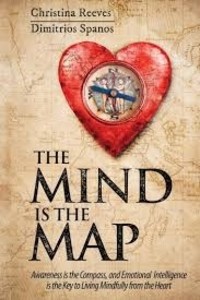 URL: https://themindisthemap.com/buy-the-book/
URL: https://themindisthemap.com/buy-the-book/
The library of self-help or self-improvement literature available to readers is enormous. This popular and profitable non-fiction genre has spawned countless sensations over the course of publishing history, particularly in the 20th century, though not every entry in the catalog left a lasting mark on the culture; sometimes wildly popular books enjoy a limited shelf life capturing the mood of a societal moment rather than enduring truths. The Mind is the Map: Awareness is the Compass and Emotional is the Key to Living Mindfully from the Heart, authored by Dimitrios Spanos and Christina Reeves, plants its flag for invoking fundamental truths about human consciousness and experience. Even a cursory reading of this text can prove rewarding for readers, but it is brimming with cover to cover riches deserving your full attention.
The book proposes there are two systems individuals can use in order to unlock their human potential. It isn’t a dry academic slanted exercise, however; the writers reveal the breadth of personal experiences shaping their observations. They label the first system “The Process”. It emphasizes building a connection with our consciousness, asking ourselves tough questions and digging deep into our character and past. An interesting turn to the prose style of The Mind is the Map is how Reeves and Spanos adopt the vocabulary of the digital age to their discussion – the writers regard the mind as a computer with references to data, downloading, processing power, et al. It is small touches like this that help make The Mind is the Map a thoroughly modern work.
AMAZON: https://www.amazon.com/Mind-Map-Journey-Discovering-Treasure/dp/173220540X
The Mind is the Map, unlike many co-authored books, takes the form of a dialogue between the writers, yet their style meshes well throughout the entirety of the work. The conversational tone never undercuts the weight of their message. Instead, it gives readers the feeling of witnessing an exchange between two people passionate about their experience and willing to share it with anyone ready to listen. This is not a scholarly work. The authors do cite outside sources to make their point, but the research involved with this book is much more personal than academic. For some, this will be a drawback. Others, however, will find this to be a strength allowing them to connect with the work instead of feeling distanced by its tone.
There are some “New Age” aspects to the work when the authors begin discussing concepts like “life force energy”, but readers aligned with their point of view will find a lot of value in these moments. The Mind is the Map, despite its good intentions, will appeal to a narrow audience – its high flown philosophical ideas will not appeal to everyone, though any potential reader can come away with something of value if they refrain from snap judgments. They advocate a variety of approaches to the subject and the writing from both authors are alight with a generosity of spirit you cannot help but respond to. Reeves and Spanos make an excellent presentation with this work and the book will have enduring value with anyone receptive to its ideas.
Gwen Waggoner
